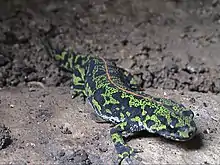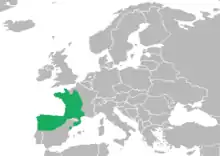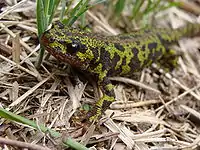Marbled newt
The marbled newt (Triturus marmoratus) is a mainly terrestrial newt native to the Iberian Peninsula and France in Europe.
| Marbled newt | |
|---|---|
 | |
| Scientific classification | |
| Kingdom: | Animalia |
| Phylum: | Chordata |
| Class: | Amphibia |
| Order: | Urodela |
| Family: | Salamandridae |
| Genus: | Triturus |
| Species: | T. marmoratus |
| Binomial name | |
| Triturus marmoratus (Latreille, 1800) | |
 | |
Description
Marbled newts have dark brown or black bodies with irregular patterns of green. They have black bellies with off-white specks. Adult females have an orange stripe running down the back from the head to the tip of the tail. Juveniles also have this stripe, but it fades on males at about 9 months. Breeding males have a large wavy crest that runs from its neck down to the tip of its tail, but is a little bit shorter where the tail meets the body. The crest is striped yellowish-white with black. Adult marbled newts are from 5 inches (13 cm) to 6.5 inches (17 cm) long.[2]

Distribution and habitat
Marbled newts live throughout most of France, and northern Spain west to the northern third of Portugal. They have a slight overlap with the pygmy marbled newt (T. pygmaeus), which take over southern Spain. Marbled newts are absent from most of the Pyrenees because of dry and unstable conditions. In northern France, the populations are more scattered due to the presence of the great crested newt (T. cristatus), with which the marbled newt hybridizes to some extent. The higher-elevation Mediterranean climates are the preferred habitat of marbled newts, and in the overlap, T. pygmaeus takes the lower elevations.
Breeding
Marbled newts use the stars to navigate to their breeding pools.[3]
References
- Jan Willem Arntzen, Robert Jehle, Jaime Bosch, Claude Miaud, Miguel Tejedo, Miguel Lizana, Iñigo Martínez-Solano, Alfredo Salvador, Mario García-París, Ernesto Recuero Gil, Paulo Sá-Sousa, Rafael Marquez (2009). Triturus marmoratus. In: IUCN 2012. IUCN Red List of Threatened Species. Version 2012.2.
- Triturus (Rafinesque, 1815), Mesotriton (Bolkay, 1927), Ommatotriton (Gray, 1850), and Lissotriton (Bell, 1839). livingunderworld.org
- Diego-Rasilla, Javier; Luengo, Rosa (2002). "Celestial orientation in the marbled newt (Triturus marmoratus)". Journal of Ethology. 20 (2): 137. doi:10.1007/s10164-002-0066-7.
External links
| Wikispecies has information related to Triturus marmoratus. |
| Wikimedia Commons has media related to Triturus marmoratus. |
- Triturus marmoratus at AmphibiaWeb
- Triturus marmoratus at Caudata Culture

